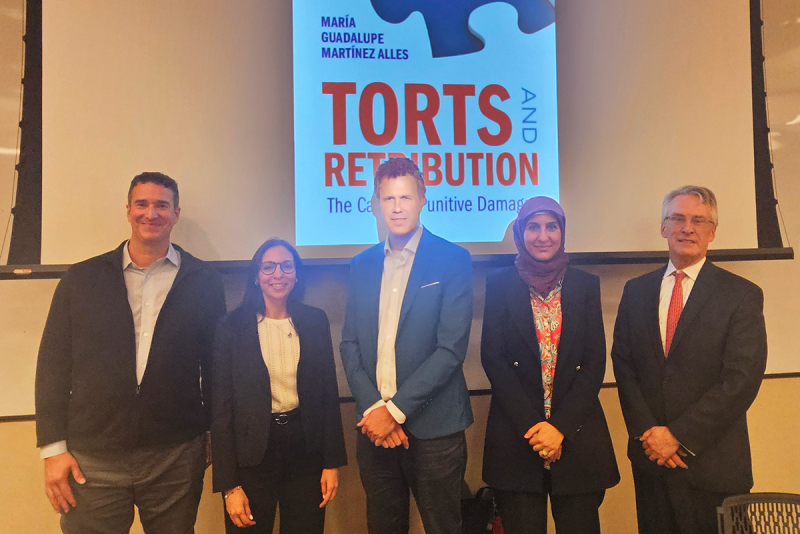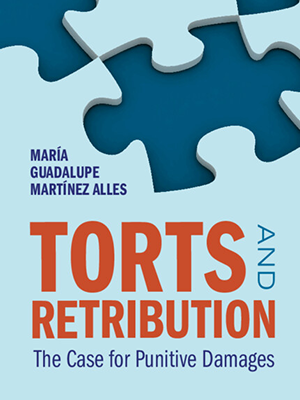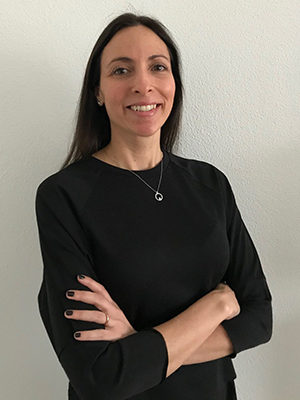Professor’s New Book Expands the Scope of Tort Theory
Professor Martinez joined the Sturm College of Law Faculty in August.

(l-r) Professor Douglas Kysar (Yale Law School), Associate Professor María Guadalupe Martínez Alles, Professor Justin Marceau, Associate Professor Zahra Takhshid, and Dean Bruce Smith (University of Denver Sturm College of Law) at the release of the new book by Professor Martínez on October 24, 2025.
One of the newest faculty members of the University of Denver Sturm College of Law, Associate Professor María Guadalupe Martínez Alles, celebrated the launch of her new book with a full audience of her fellow faculty, students, and other members of the law school community last Friday. Published in 2025 by Cambridge University Press, Martínez’s “Torts and Retribution: The Case for Punitive Damages,” is a cross-disciplinary approach to tort theory that “offers an extraordinarily rigorous and fascinating analysis of the role and justification of punitive damages in the common law of torts,” according to Douglas Kysar, a Yale Law School professor who was one of several legal scholars at the event to speak about the book.
In his introduction, Dean Bruce Smith observed that retributivism as a legal theory has been given a “second class status,” and characterized Martínez’s approach to the subject in this book as “courageous, distinctive, important, and trailblazing.” Smith noted that in the case of relational retribution, in which emotions are called into play to decide how wrongdoers who have hurt plaintiffs should receive justice, the role of judges and juries comes into play. Unlike legal systems that avoid juries altogether, viewing their verdicts as “the antithesis of reasoned judgement,” the American system relies on their assessments. Martínez’s scholarship, according to Smith, follows in a tradition that suggests that juries “actually have quite structured ways of thinking about blame worthiness,” and that “put simply, punitive damages may no longer be an American disadvantage…but in appropriate settings, an American advantage.”
For Kysar, it was a “great honor” to be Martínez’s doctoral supervisor at Yale, where this scholarship formed the basis of Martínez’s JSD dissertation. Speaking of Martínez, Kysar said, “she is an immensely talented scholar whose dedication and passion for the life of the mind are matched by the range and depth of her intellectual interests, which are in turn matched by the clarity and incisiveness of her analysis and her pen."
In his comments, Kysar placed Martínez’s work in the context of the history of tort law scholarship and drew real-world parallels with highly illustrative (and entertaining) examples of a trial lawyer’s attention-grabbing and emotionally appealing advertisements. Admiring the book’s “clarity and concision,” Kysar noted that Martínez draws from cognitive and social psychology, seeking “to understand the motivations victims of wrongful conduct have for demanding not only financial compensation and a measure of civil recourse, but also, at least in some circumstances, retributive justice.”
Two Denver Law faculty members were also on hand to provide thoughtful commentary on the book, Professors Justin Marceau and Zahra Takhshid. Marceau, who shared that he personally has “a great deal of skepticism about retribution,” and has written about it frequently, found the book to be challenging in a way that was “exactly what I would hope for” and “would expect to learn from.” Marceau also said that Martínez powerfully “reimagines [victims of wrongdoing] not as passive sufferers, but persons who have suffered and need to be compensated for that through moral dialogue and accountability.”
Takhshid, who like Martínez and Smith is a teacher of torts, noted that Martínez’s book provides a comparative law context with both the European Union and Latin America, and described some additional parallels to concepts addressed in Islamic legal tradition. Focusing on the potential application of an expanded use of punitive damages in the United States, Takhshid imagined how these concepts might help plaintiffs in consumer products liability lawsuits hold powerful corporations accountable.
After hearing the commentary from her colleagues and mentor, Martínez expressed her gratitude for their insights and inspiration, and for being welcomed so wholeheartedly to the University of Denver community.
Recounting what led her to pursue this area of legal scholarship, Martínez noted that her home country of Argentina was “the first civil law jurisdiction in the world to introduce punitive damages in the realm of consumer protection law, mostly inspired by the American practice and experience with the institution. … Punitive damages allowed me to build bridges and to foster constructive dialogue and understanding across legal jurisdictions.”
Martínez reflected on the insights she gained about human behavior from social sciences: “by combining denunciation of reprehensible wrongdoing and seeking affirmation of their own self-worth, tort victims are no longer passive recipients of wrongful behavior seeking compensation, but instead active participants in the construction of other-regarding meaning in our society.” Martínez said her hope for “Torts and Retribution” is that it will help “overcome the theoretical boundaries” that have separated various areas of civil and criminal law that could be “complementary mechanisms … to protect citizens’ safety, privacy, dignity, and psychological integrity.”
"Torts and Retribution: The Case for Punitive Damages" (August 2025) is available in various formats from Cambridge University Press.




